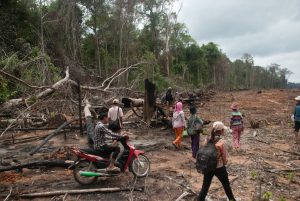The U.S. government announced yesterday that it would prematurely end a $21 million forest protection program in Cambodia, marking a new downturn in relations between the two nations. In a statement, the U.S. Embassy in Phnom Penh stated that that the U.S. Agency for International Development (USAID) would stop funding the Greening Prey Lang project because Cambodia’s government was not doing enough to stop deforestation in protected areas.
The Prey Lang Wildlife Sanctuary, whose 3.3 million hectares sprawl across four provinces in the northeast of Cambodia, is the largest contiguous area of lowland dry evergreen and semi-evergreen forest left in mainland Southeast Asia, and is a crucial biodiversity area that is home to dozens of endangered plant and animal species.
But since 2016, the same year that the Cambodian government designated Prey Lang a protected area, the sanctuary has lost 38,000 hectares of forest – nearly 9 percent of its total, the embassy statement claims. Despite USAID’s support for increased ranger patrols, training of law enforcement, and development of a national protected area management system, it added, “the situation is worsening.”
“Well-documented illegal logging continues in and around the Prey Lang Wildlife Sanctuary, and Cambodian authorities have not adequately prosecuted wildlife crimes or put a stop to these illicit activities,” the embassy statement read. “In addition, the government continues to silence and target local communities and their civil society partners who are justifiably concerned about the loss of their natural resources.”
The announcement came a day after news broke that at least three environmental campaigners had been arrested in and around the capital Phnom Penh, reportedly for filming sewage in the river. While details of their alleged transgression remains unclear, a National Police official has confirmed that three have been charged with “plotting,” a crime punishable by five to 10 years in prison. In the past, the authorities have also arrested activists associated with the Prey Lang Community Network, who have led community protests and undertaken patrols within the sanctuary.
USAID’s remaining funds from the project will instead be diverted “to support civil society, the private sector, and local efforts to improve livelihoods and expand climate sensitive agriculture.”
The U.S. decision comes amid a marked downturn in bilateral relations, linked to the Cambodian government’s recent authoritarian turn and its concurrent move toward a rising China.
A particular subject of tension has been the Chinese military’s activities at the Ream Naval Base, which is situated on the Gulf of Thailand in Preah Sihanouk province. The U.S. is concerned that Cambodia has permitted China to station military assets there. Last week, U.S. defense attache Col. Marcus Ferrara abruptly ended a visit to the base, claiming that his delegation had not been granted “full access” to the site.
The Cambodian government denies any plans for a permanent Chinese presence at Ream. Following the aborted visit, Cambodia’s Defense Ministry accused the U.S. of “distorting the facts.” It said Ferrara had been at the site for three hours but demanded to enter a place “not included in the initial request.”
Cambodian and Chinese leaders have repeatedly denied that there are plans to host Chinese military assets at Ream, claiming that Beijing is merely helping to refurbish some facilities at the base. But the government’s prickly response will have done little to assuage U.S. concerns.
The base imbroglio reflects the mutual lack of trust that has begun to dog Cambodia-U.S. relations in a context of intensifying Sino-American rivalry. Mistrustful of Prime Minister Hun Sen’s embrace of Chinese largesse, USAID seems to have chosen this moment to sever its ties to a forest protection program for which the government has shown little substantial commitment. Most likely, it was a decision that has been made for some time.
For years, foreign donors have funded a range of initiatives in Cambodia’s forestry sector. Most have assumed the good faith of the government agencies tasked with combating logging and other forest crimes, treating these as problems that can be resolved through capacity building efforts and other technocratic fixes.
But as I have detailed at length elsewhere, these efforts have failed to recognize the political structures and incentives that drive illegal logging in Cambodia, which is intimately entwined with the patronage networks of the ruling Cambodian People’s Party and its associated business and military elites. For this reason, most have failed to make any serious inroads into the problem.
Conservationists and researchers have long criticized USAID’s involvement in Prey Lang on exactly these grounds. San Mala, advocacy officer for Cambodian Youth Network, which has been active in Prey Lang, told the Voice of Democracy news site yesterday that community forestry activists welcomed USAID’s withdrawal from the Greening Prey Lang project, “because the fund really did not provide benefits for the community and forest protectors.”
Where this leaves the poor state of Cambodia-U.S. relations remains to be seen. With a dynamic of mutual mistrust now seeping into most parts of the bilateral relationship, for the moment at least there seems to be little to arrest the slide.

































